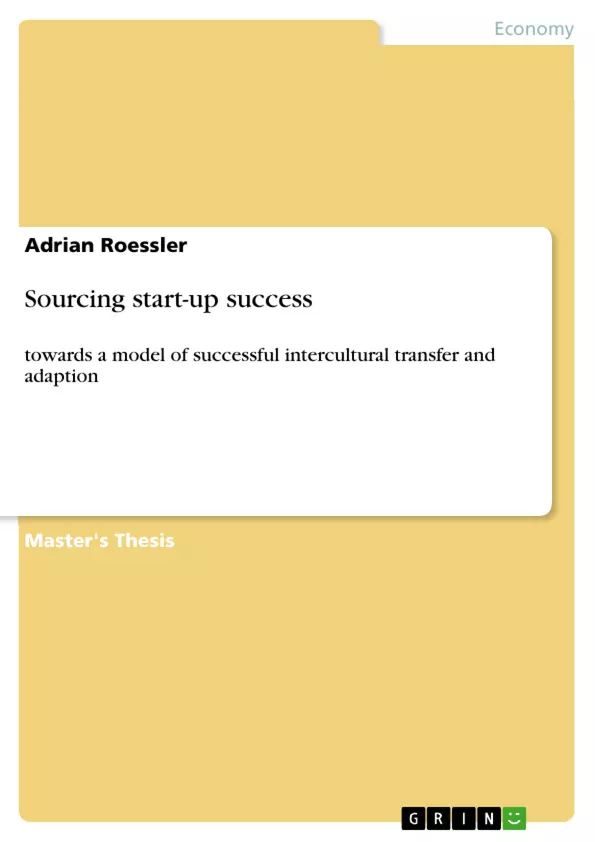The purpose of this paper is three-fold. First, it is intended to establish a new framework by combining literature streams on start-up success with research on cultural and institutional environments. Although a wide array of literature on start-ups, cultural and institutional literature exists, connecting research is underdeveloped. This paper hence sets out to bridge these differing streams of literature.
1 In fact, one has to bear in mind that although always termed a worldwide crisis, many developing countries and BRIC states have not been affected.
Second, drawing upon the impact of globalization and the Internet, new implications for the sourcing of business ideas will be generated. A lot of attention has been paid to the development of start-ups and the characteristics of entrepreneurs. However, the step in the development chain where the idea is generated has received comparably low attention. This paper thus tries to explore some sources and mechanisms evolved through globalization and use of the Internet.
Third, a case study designed to explore the above-mentioned new framework and implications is expected to support the development of a new model. It is therefore the overall purpose of this paper to produce a theoretically grounded and practically applicable model. A model that should cover the most important aspects when copying and implementing a business concept from a different country.
Inhaltsverzeichnis (Table of Contents)
- Introduction
- Aim of the paper
- Structure of the paper
- Methodology and sourcing of information
- Tapping the global farm for business ideas
- Influence of globalization
- Influence of the Internet
- Imitation and copycatting
- Success factors of start-ups
- The business model
- Business planning
- The team as key asset
- The power of the network
- Funding as growth driver
- The cultural environment
- Hofstede's cultural dimensions
- Cultural differences and their effect on start-ups
- The institutional environment
- The effect of the institutional context on success factors
- Legal issues as a stumbling block
- Case study: the daily deal mania
- The couponing market pre Groupon
- The new business model
- The hype starts
- The European clone wars
- Big money for fast scaling
- Groupon's shopping spree and outlook
- Case study part 2: adaption difficulties
- Institutional context
- The cultural context
- Developing the model
Zielsetzung und Themenschwerpunkte (Objectives and Key Themes)
This paper investigates the success factors of start-ups, particularly those based on new business models that have gained traction through global impact and the influence of the internet. The paper examines the role of cultural and institutional environments in facilitating or hindering the transfer and adaptation of successful start-up models across borders. It explores the interplay between the success factors of start-ups and the specific challenges of cultural and institutional contexts, using the example of the "daily deal mania" to illustrate these dynamics.
- Success factors of start-ups
- The role of the cultural environment in start-up success
- The influence of the institutional environment on start-up success
- The transfer and adaptation of start-up models across borders
- The impact of globalization and the internet on start-up ecosystems
Zusammenfassung der Kapitel (Chapter Summaries)
The introduction sets the stage by highlighting the rise of successful web-based start-ups and emphasizing the importance of understanding their success factors. Chapter 2 explores the broader context of globalization and the internet's impact on the emergence of new business models. Chapter 3 delves into key success factors of start-ups, encompassing aspects like the business model, planning, team composition, networking, and funding.
Chapter 4 examines the cultural environment, focusing on Hofstede's cultural dimensions and their implications for start-up success. Chapter 5 delves into the institutional environment, exploring how legal frameworks and regulations can impact the success factors identified earlier.
Chapter 6 presents a case study of the daily deal mania, tracing the evolution of the couponing market, the rise of Groupon, and its global expansion. Chapter 7 delves into the adaption difficulties encountered when transferring the daily deal model to different cultural and institutional contexts.
While the conclusion is excluded from this preview, it's likely to synthesize the insights gathered from the previous chapters and offer a comprehensive model for understanding the successful transfer and adaptation of start-up models across borders.
Schlüsselwörter (Keywords)
The key concepts explored in this paper revolve around start-up success, intercultural transfer, and adaptation of business models. The paper draws upon research on globalization, the influence of the internet, cultural dimensions, and institutional environments. It investigates the role of success factors like business models, planning, team composition, networking, and funding in the context of cultural and institutional contexts. Furthermore, the paper uses the case study of the "daily deal mania" to illustrate the complexities of transferring and adapting successful start-up models across borders.
Frequently Asked Questions
What are the key success factors for a web-based start-up?
Critical factors include a scalable business model, a strong founding team, effective business planning, a powerful network, and access to funding.
How does the cultural environment affect start-up success?
Cultural dimensions, such as those defined by Hofstede, influence consumer behavior and management styles, determining how well a business model can be adapted to a new country.
What is the "daily deal mania" case study about?
It analyzes the rise of Groupon and its global expansion, highlighting the challenges of "copycatting" business models in different institutional and cultural contexts.
Why do institutional environments matter for start-ups?
Legal frameworks, regulations, and institutional support can either act as a catalyst or a major stumbling block for start-ups entering new markets.
What is "copycatting" in the start-up world?
Copycatting refers to copying a successful business idea from one country and implementing it in another, often by clones like those created by Rocket Internet.
- Citar trabajo
- Adrian Roessler (Autor), 2011, Sourcing start-up success, Múnich, GRIN Verlag, https://www.grin.com/document/177782



